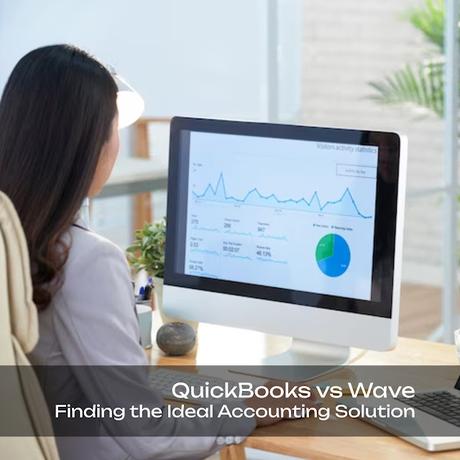
As a business owner, managing your finances can often be a daunting task. However, with the rise of accounting software solutions like QuickBooks and Wave, keeping track of your expenses has never been easier. But which one is right for you? In this blog post, we’ll compare QuickBooks vs Wave to help you find the ideal accounting solution for your business needs. So sit back and read on – we’ve got you covered!
Comparing QuickBooks vs Wave
When it comes to choosing an accounting software solution for your business, two popular options are QuickBooks and Wave. QuickBooks vs Wave both offer a range of features designed to make managing finances easier, but which one is right for you?
QuickBooks is a comprehensive accounting software that offers everything from invoicing and payroll management to inventory tracking and tax preparation. It’s ideal for larger businesses with more complex financial needs.
On the other hand, Wave Accounting is a simpler option that provides basic bookkeeping services such as invoicing, expense tracking, and bank reconciliation. It’s free to use (with some paid add-ons) making it an excellent choice for small businesses or sole proprietors just starting out.
Ultimately, the choice between QuickBooks vs Wave will depend on the size of your business and your specific financial needs. By comparing their features side-by-side, you’ll be able to choose the best accounting solution for your unique situation.
QuickBooks Overview
QuickBooks is a popular accounting software that has been around since 1983. It was initially developed by Intuit and aimed at helping small businesses manage their finances more efficiently. The software provides various features such as invoicing, expense tracking, payroll management, inventory management among others.
One of the most significant advantages of QuickBooks is its user-friendly interface. Even those with limited accounting knowledge can use it without much trouble. Additionally, QuickBooks offers both online and desktop versions to cater to different users' needs.
Another notable feature of QuickBooks is its integration capabilities with other applications like banks and payment gateways which helps streamline financial transactions quickly.
The software also provides multiple reporting options for analyzing business performance in real-time. Users can generate profit & loss statements, balance sheets or cash flow reports easily and track their business's overall financial health.
QuickBooks is an excellent choice for small businesses who need a reliable tool for managing their financial data effectively while keeping things simple and easy-to-use.
Wave Accounting Overview
Wave Accounting is a cloud-based accounting software that offers free invoicing, receipt scanning, and expense tracking. It also has paid services for payroll and payment processing. The company was founded in 2009 to help small business owners manage their finances easily and affordably.
One of the advantages of using Wave Accounting is its user-friendly interface. The dashboard presents all financial data at a glance including income, expenses, profit/loss statements, cash flow reports, and more. Users can customize invoices with their own branding elements such as logos or colors.
Another feature of Wave Accounting is automation which saves users time by automatically categorizing transactions based on history. This makes it easier for users to reconcile bank statements without manual inputting every transaction.
The app's mobile version lets you take pictures of receipts while on the go so you don't have to worry about losing them later on during tax season.
Wave Accounting provides excellent customer support through messaging or email channels available from the website itself making it easy for customers who need assistance 24/7!
QuickBooks vs Wave Features
When it comes to accounting software, QuickBooks and Wave are two of the most popular options available. Both platforms offer a range of features designed to make managing your finances easier. However, there are some key differences between the two that may impact which one is right for you.
QuickBooks offers a wide range of features including invoicing, expense tracking, inventory management, payroll processing and more. It also has integrations with over 650 third-party applications such as PayPal and Shopify. This makes it easy to customize your experience based on your specific business needs.
In comparison, Wave offers basic features such as invoicing, payment processing and receipt scanning for free. Additional services like payroll or recurring billing come at an additional cost. While this makes it less comprehensive than QuickBooks in terms of functionality, it can be ideal for small businesses just starting out who need a simple solution.
One area where Wave stands out is its user interface which is intuitive and easy-to-use compared to QuickBooks' complex UI that can take some time to master. Another advantage of using Wave is that it's completely free which makes it ideal for bootstrapped startups looking for cost-effective solutions.
The QuickBooks vs Wave both platforms have their unique strengths when it comes to feature sets but depending on what you're looking for in an accounting software will ultimately determine whether you choose QuickBooks or Wave as your preferred platform.
QuickBooks vs Wave Pros and Cons
Both QuickBooks and Wave offer several advantages and disadvantages, depending on your business needs. Let's take a closer look at some of the pros and cons of each accounting solution.
QuickBooks' main advantage is its robust feature set. It offers comprehensive bookkeeping, invoicing, payroll processing, inventory tracking, time tracking, project management, tax preparation features that can support businesses of all sizes. However, it comes with a higher price tag compared to Wave.
On the other hand, Wave's primary benefit is its affordability as it provides all core functionalities like bookkeeping tools for free which makes it ideal for startups or small enterprises with limited budgets. Nonetheless this system doesn't include many advanced features such as inventory management or project tracking which can be limiting for larger companies.
Another disadvantage of QuickBooks is its steep learning curve due to its wide range of capabilities that may be overwhelming for new users while making them prone to errors in using the software initially. In contrast, Wave has a simpler interface but lacks customization options compared to QuickBooks.
In summary both platforms have their own unique strengths and weaknesses based on specific business goals so choosing between them requires careful consideration of what will work best for you!
Which accounting solution is best for you?
Choosing the best accounting software solution for your business is crucial in ensuring its financial health. When deciding between QuickBooks and Wave, it's important to consider your specific needs and budget.
If you're a small business owner with basic accounting needs, Wave may be the better option as it offers free invoicing, receipt scanning and expense tracking features. It also has an intuitive user interface that is easy to navigate.
On the other hand, if you require more advanced features such as inventory management or payroll processing, QuickBooks may be more suitable for your business. It offers various pricing plans that cater to businesses of different sizes and complexities.
Another factor to consider is integration options. If you use other software tools such as CRM or e-commerce platforms, make sure that the accounting solution you choose can integrate with them seamlessly.
Ultimately, the best accounting solution depends on your unique situation. Do some research beforehand and make a list of must-have features before making a decision.
Conclusion
After thoroughly comparing QuickBooks vs Wave, it is clear that both accounting solutions have their respective advantages and disadvantages.
QuickBooks offers a more comprehensive set of features, making it the ideal choice for small to medium-sized businesses with complex accounting needs. Its scalability and integration with other business tools make it a top choice for growing companies.
On the other hand, Wave's simplicity and affordability make it perfect for freelancers or very small businesses just starting out. It may lack some advanced features offered by QuickBooks but its user-friendly interface and cost-effectiveness make up for this limitation.
Ultimately, choosing between QuickBooks vs Wave depends on your specific business requirements. Consider factors such as budget, complexity of accounting tasks, scalability needs before making a decision.
In conclusion (oops!), both QuickBooks and Wave are excellent options in their own right depending on what you need from an accounting solution. By understanding your unique requirements as a business owner or freelancer, you can easily decide which software is best suited for your needs.

